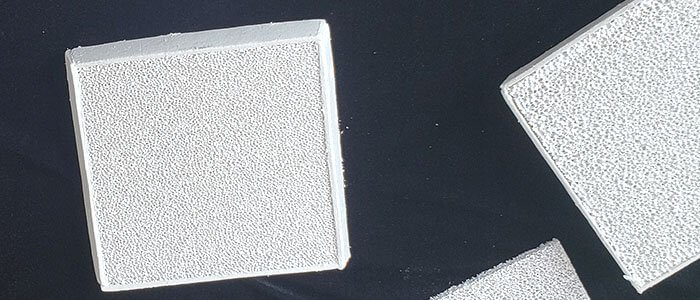Alumina ceramic foam filter is a new kind of ceramic material with a unique network structure that allows the passage of liquid metal while filtering out impurities. It is widely used in the industrial sector for its high thermal stability, corrosion resistance, and excellent filtering efficiency. The use of alumina ceramic foam filters has been an increasing trend globally due to its numerous advantages. In this article, we will analyze the proportion and usage of Alumina ceramic foam filters in the Italian market.
Overview of Alumina Ceramic Foam Filter
Alumina ceramic foam filter is a highly porous and open-celled ceramic material used to remove impurities from liquid metals. Unlike other filtration systems that require a mesh or screen to sift out impurities, alumina ceramic foam filters have a unique network structure that allows for the unhindered flow of molten metal. The filter’s open-cell structure ensures that the metal’s surface tension holds the filter’s pores open, allowing for maximum filtration capacity.
Alumina ceramic foam filters are made by creating a ceramic slurry mixture and then foaming it using polyurethane foam. The foam structure traps the ceramic slurry mixture within its cells, forming a hardened filter when the polyurethane foam is burned out.

Proportion of Alumina Ceramic Filter in the Italian Market
The use of alumina ceramic foam filters has increased significantly in the Italian market in recent years. The proportion of alumina ceramic foam filters varies across different industries. For example, the foundry industry in Italy relies heavily on alumina ceramic foam filters for the production of high-quality castings.
The current market for alumina ceramic foam filters in Italy is growing at a steady rate. The increase in demand is from the expanding foundry industry, and the proportion of alumina ceramic foam filters should continue to rise in the coming years. In 2019, the Italian market for alumina ceramic foam filters was valued at €20 million, and the growth rate was 5%. With the increasing demand for high-quality castings, the market is expected to hit €27 million by 2025, with an annual growth rate of 3%.
Applications of Alumina Ceramic Filter in the Italian Market
The use of alumina ceramic foam filters is widespread across different industries in Italy. Here are some of the industries using alumina ceramic foam filters:
1. Foundries
The foundry industry in Italy is one of the biggest users of alumina ceramic foam filters. Aluminum investment casting is quite common in the Italian foundry industry, with alumina ceramic foam filter being an essential component of the casting process. Alumina ceramic foam filters help to remove impurities, such as oxides and inclusions, from the liquid aluminum, ensuring that the final cast product meets the required standards for quality.
2. Steel Industry
The steel industry in Italy also uses alumina ceramic foam filters in filter casting processes. Alumina ceramic foam filters help to improve the quality of cast steel by removing impurities such as slag and inclusions.
3. Automotive Industry
The automotive industry in Italy is also a significant end-user of alumina ceramic foam filters. The use of alumina ceramic foam filters in the automotive industry is mainly for investment casting parts, such as engine blocks and cylinder heads. The filters help to ensure the final product meets required quality standards and have a high level of structural integrity.
4. Aerospace Industry
The aerospace industry in Italy also uses alumina ceramic foam filters extensively. The industry requires high-quality materials, and the use of alumina ceramic foam filters ensures that the products produced attain the required quality.
Benefits of using Alumina Ceramic Filter
1. High Filtration Efficiency
Alumina ceramic foam filter has a unique network structure that provides high filtration efficiency, up to 99%. This ensures that impurities that are harmful to the final product are removed.
2. Cost-Effective
The use of alumina ceramic foam filter is cost-effective as it reduces the amount of impurities in the final product, reducing the need for expensive post-casting treatment processes.
3. Improved Product Quality
The use of alumina ceramic filter ensures that the final product meets the required quality standards, reducing defects and enhancing product performance.
4. Enhanced Services Life
The unique structure of the alumina ceramic foam filter ensures that it has a longer service life compared to other filtration systems.
Conclusion
The Italian market for alumina ceramic foam filters is on a steady increase, and this is due to the numerous advantages that come with the use of the filter. Industries such as the foundry industry, steel industry, automotive industry, and aerospace industry all use alumina ceramic filters to enhance their product quality. The unique network structure of the alumina ceramic filter provides high filtration efficiency, is cost-effective, improves product quality, and has a longer service life. The increasing demand for high-quality castings in Italy means that the market for alumina ceramic foam filters is expected to continue to grow in the coming years.


